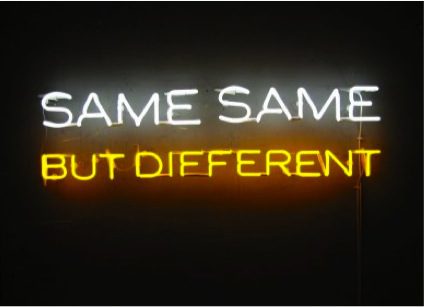
Twenty years before my first child was born, my sister, Leah, and I traveled to Thailand together. We discovered a colloquialism that seemed ubiquitous to the country: Same same but different. Here is an example of how the words were employed. In a restaurant I order an orange. The waiter brings me kumquats. I say, “Um, I ordered an orange. These are kumquats.” The waiter responds, “Same same, but different.”
The saying was always greeted with a quizzical look from my sister and me. On the surface it doesn’t make any sense. How the heck can things be the same and also different?
Now, as a parent, I think of “same same but different” in a whole new light. Parents often use a one-size-fits-all approach with their children. Two kids take cookies without asking, and Mom and Dad punish them identically. No dessert for a week. You have two sons. They both get in scuffles on the schoolyard. Both received stern talking-tos and no TV for a week. This is how parents generally work. A punishment is a punishment is a punishment. The temperaments and personalities of the individual children are not considered.
But kids do not emerge from a one-size-fits-all box, and they often require very different responses to life’s challenges than their siblings.
I was reminded of this after listening to an episode of the This American Life podcast. The subject was regret. As a child Elna Baker was caught whacking her sister over the head with a broom. Her father–who would have simply punished his other children–instead decided the best route would be to conduct a mini-trial. Elna held steadfast that she didn’t commit the act on purpose. Instead of punishing Elna, her father did nothing. He let her get away with it. He figured that would be a more effective punishment for Elna.
And it was. Elna thought about the incident for the ensuing 15 years into adulthood. She is still apologizing.
Parents need to realize that while their kids are growing up in the same house, they need not be treated equally all the time. Kids will complain that parents aren’t being fair. Guess what? They are right. That’s OK.
It is impossible to make all efforts with your children equal. So stop trying. Give your children what they need, when they need it.
I snuggle and hug and kiss one child because it comforts him. And I blow a kiss to the other because that is right for her. One gets a new desk, one doesn’t. One needs more reminders to be thoughtful. One needs more time out while the other needs more discussion.
Same same, but different.

